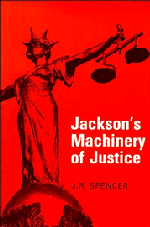Book contents
- Frontmatter
- Contents
- Acknowledgements
- List of figures
- List of tables
- Preface
- Preface to the first edition of ‘The Machinery of Justice in England’
- Abbreviations
- I Historical introduction
- II Civil jurisdiction
- 4 Civil law and criminal law
- 5 County courts
- 6 The High Court
- 7 The mode of trial
- 8 Complaints about the civil courts
- 9 The enforcement of judgments and orders
- 10 The Civil Division of the Court of Appeal and the House of Lords
- 11 The Judicial Committee of the Privy Council
- 12 Arbitration
- III Tribunals
- IV Criminal jurisdiction
- V The personnel of the law
- VI The European dimension
- VII The cost of the law
- VIII Law Reform
- Appendix A The Report of the Civil Justice Review
- Table of Cases cited
- Table of Statutes cited
- Table of Stationery Office publications cited
- Index
6 - The High Court
Published online by Cambridge University Press: 10 January 2011
- Frontmatter
- Contents
- Acknowledgements
- List of figures
- List of tables
- Preface
- Preface to the first edition of ‘The Machinery of Justice in England’
- Abbreviations
- I Historical introduction
- II Civil jurisdiction
- 4 Civil law and criminal law
- 5 County courts
- 6 The High Court
- 7 The mode of trial
- 8 Complaints about the civil courts
- 9 The enforcement of judgments and orders
- 10 The Civil Division of the Court of Appeal and the House of Lords
- 11 The Judicial Committee of the Privy Council
- 12 Arbitration
- III Tribunals
- IV Criminal jurisdiction
- V The personnel of the law
- VI The European dimension
- VII The cost of the law
- VIII Law Reform
- Appendix A The Report of the Civil Justice Review
- Table of Cases cited
- Table of Statutes cited
- Table of Stationery Office publications cited
- Index
Summary
The High Court was created by the Judicature Acts 1873–75, the general plan of which was given in chapter 1. Today its constitution is contained in the Supreme Court Act 1981, which consolidates the Judicature Acts and later amendments to them.
Its jurisdiction in civil matters is almost unlimited. Apart from a few special matters which by statute must be brought in a county court, the High Court can hear any case great or small, and can take any case that can come before a county court as well as everything that is outside county court limits. In practice, however, litigants are discouraged from taking small cases to the High Court and in practice it is only the weightier matters which are heard there. If, for instance, an action is begun in the High Court when it could have been brought in the county court, such as an ordinary trade debt, two things may happen. First, a High Court registrar or master may order the case to be transferred to a county court. This may occur if the sum in dispute is within the £5,000 limit for starting county court proceedings and, under a rule introduced in 1981 in an attempt to shift more business to county courts, it may also occur in cases with larger sums at stake if the issues of law or fact are simple.
- Type
- Chapter
- Information
- Jackson's Machinery of Justice , pp. 36 - 68Publisher: Cambridge University PressPrint publication year: 1989

